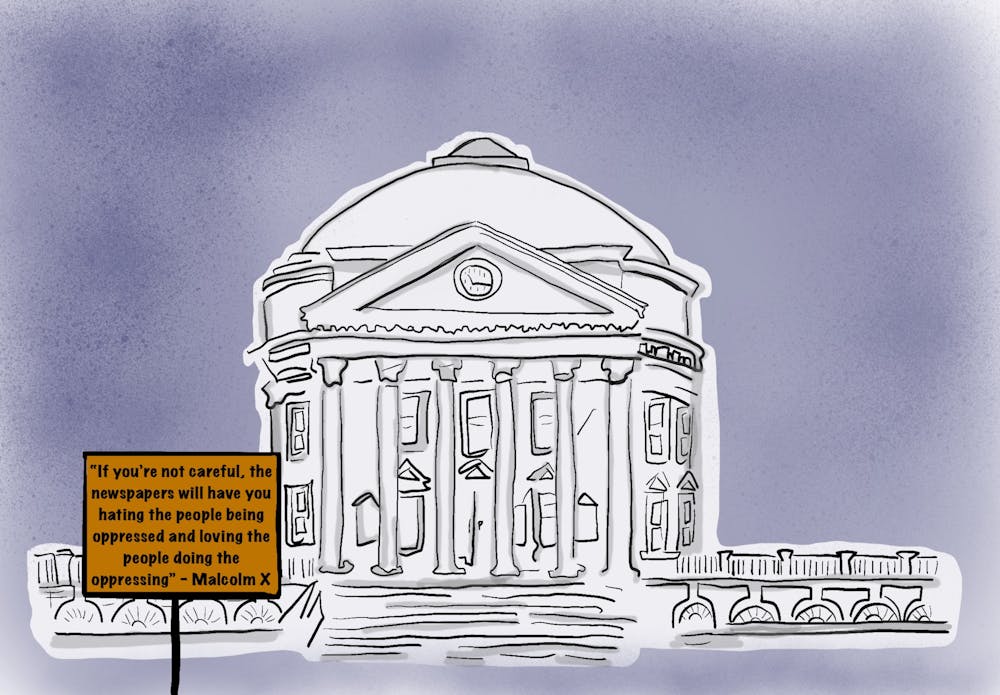According to the University, it aims to graduate a diverse range of students who have been genuinely included and valued in this community and who go on to become leaders who are able to face the multicultural complexities of our world. This language theoretically demands supporting Palestinian students, yet the University’s actions are at odds with its stated commitment, particularly amidst rising Islamophobia and xenophobia. The administration’s failure to condemn blatant discrimination only leads to more discrimination, fostering an atmosphere that misinterprets pro-Palestinian sentiments as support of terrorism — leading to a rise in harassment that targets Muslim and Arab students.
In early October, the international community mourned the loss of over 1,100 Israelis. While this loss was unequivocally tragic, the evil acts committed in response to the October Hamas attack have understandably led numerous students and student-led organizations to show solidarity with Palestine. Much of the support — the protests and teach-ins, along with vigils open to the community — have helped make students more aware of the situation in Gaza. While great progress has been made, the language of these student organizations has been subtly manipulated to portray legitimate Palestinian resistance as something nefarious, dehumanizing the students behind this activism and othering a legitimate cause.
The framing of Palestinians as less than human and activism on their behalf as dangerous is not unique to the University. This perspective has been traced back to the creation of the state of Israel in 1948 when Palestinians were painted as antisemitic terrorists who could not be reasoned with. Such prejudices are kept alive through the language used by the Israeli government that contributes to the degradation of Palestinians — particularly the Israeli Defense Minister, Yoav Gallant, who referred to Palestinians as animals. Even members of our own Congress have made similar remarks, such as Florida Rep. Brian Mast, who said there were few “innocent Palestinians” in Gaza.
This marginalizing language also exists within the University’s community. Here, there is also specific language which attempts to conceal the ongoing genocide in Gaza, as well as diminish continued protests of Palestinian students here at the University. The well-known Hasidic group Chabad, for example, published a statement in the wake of Oct. 7. While this message sent support to Israel, it also encouraged readers not to engage with “trolls [who] are being sent to distract us.” Although Chabad may have intended to provide comfort to a grieving community, the impact of this language is that it conflates pro-Palestinian activists with internet trolls. This implies that pro-Palestinian activism is intrinsically dangerous and makes it that much easier to propagate dehumanizing rhetoric.
This villainization of pro-Palestine action is deemed acceptable when there is consistent administrative inaction which largely manifests in an unwillingness to actively recognize and condemn the loss of Palestinian lives. For example, President Ryan’s initial letter to students after Oct. 7 did not just fail to acknowledge Israel’s consistent attacks on Palestinians in Gaza and the West Bank for the last 75 years, it failed even to say the word “Palestine '' within its main body. To its extreme credit, this letter did condemn the tragic and extensive loss of Israeli life on Oct. 7. But in the same way Ryan condemned the loss of Israeli life, it is past time that he condemns the murder of Palestinians. There are currently roughly 30,000 murdered Palestinians, with over 7,000 still missing and thousands more injured. In short, administrative reluctance to deal equally with the lived experiences of Israelis and Palestinians continues to perpetrate a culture of discriminatory language.
This language does not exist in a vacuum — rather, it has real consequences, particularly when the present language perpetuates dangerous stereotypes. The reluctance to engage with Palestinian voices has undoubtedly led to an increase in violence within the United States. For example, students at Harvard University who were advocating for Palestine and calling for a ceasefire were severely doxxed. In mid-October, a billboard truck displaying the names and faces of students under the heading “Harvard’s Leading Antisemites” circled Cambridge and New Haven over several days. Other students have found their photos and personal information — including full names as well as educational and employment histories — displayed on websites and social media accounts labeling them as “terrorist sympathizers.” These are some of the many recent instances that depict hatred for pro-Palestinian language and actions. As a result, Palestinian, Arab and Muslim students on campuses self-censor for fear of being doxxed, defamed, harassed and assaulted.
The dehumanization of Palestinians in the United States and across the world has disproportionately burdened pro-Palestinian students. It has not only synonymized their identity with terrorism but also discredited their voices and stories. This is part of a larger phenomenon in which individuals within the United States and students at this university are conditioned to use dangerous language for and attach the word “terrorism” to Black and Brown people. At a minimum, the University must equally recognize Islamophobic and xenophobic language on Grounds. Call it what it is. It is anti-Palestinian bigotry. It is a refusal to see Palestinians as equal humans. It is shameless hatred towards Brown individuals, and the deliberate abuse of language to continue perpetuating such dangerous narratives. And it must stop.
Ayat Younis is an Opinion Columnist who writes about academics for The Cavalier Daily. She can be reached at opinion@cavalierdaily.com.
The opinions expressed in this column are not necessarily those of The Cavalier Daily. Columns represent the views of the authors alone.







